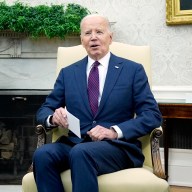OTTAWA – Canada’s central bank says the current recession will be deep and painful but relatively short-lived.
The Bank of Canada’s first detailed economic analysis this year shows three-quarters of contraction in Canada, beginning last fall and continuing until mid-2009.
The January-March quarter retreat will be particularly pronounced, with a 4.8 per cent annualized rate of decline.
But in a break with many private-sector economists, bank governor Mark Carney says Canada will start bouncing back as early as July, grow strongly next year at a 3.8 per cent clip and return to full capacity in mid-2011.
“When recoveries come, they come sharply,” said Carney in a news conference.
The central banker says the extraordinary monetary and fiscal stimulus being injected around the world – including a multibillion-dollar package expected from Ottawa in Tuesday’s budget – will be instrumental in rescuing economies.
Canada’s recovery will be quicker than previous recessions in 1981-82 and 1990-92 and stronger than other G7 countries because of the relative health of the economy, including low interest rates, low inflation, government balance sheets and relatively low unemployment entering the slump, Carney said.
“Our level of indebtedness is far less than in other countries and our budgetary wiggle room of the federal government and provincial governments is much better than before,” he said.
He would not divulge how much stimulus he expects in the budget, but said the forecast assumes “significant” stimulus.
Prime Minister Stephen Harper has suggested Ottawa is prepared to inject up to $30 billion in spending for such things as infrastructure construction and tax cuts.
Another factor helping the Canadian economy going forward, Carney said, is the depreciation of the loonie from around parity with the U.S. greenback last year to below 80 cents US currently.
But the big factor in any turnaround, Carney said, will be unclogging global financial markets that have effectively stalled economic activity by making credit for businesses difficult or costly or just plain unavailable.
The central bank says it detects faint signals of easing money markets and believes credit conditions will continue to improve.
“The anticipated normalization of financial conditions, together with the stimulus coming from monetary and fiscal policies, should boost the growth of consumer spending in 2010,” the bank writes in its January Monetary Policy Report.
Canada’s money markets, although tight, have not been as adversely effected as in many other counties, the bank adds.
While effective interest rates to businesses and households remain high relative to the Bank of Canada’s historically low benchmark rate – dropped to one per cent this week – commercial rates are lower than when the crisis began.
The bank also says availability of credit in Canada remains relatively healthy, although it notes some non-bank lenders have ceased operations.
Finance Minister Jim Flaherty called tight credit the top concern heard in public pre-budget consultations, but the report notes business credit has grown since October and loans to households, while they have slowed and will continue to slow, are still above historic levels.
One reason for the disconnect, suggests Carney, is that before the crisis hit in August 2007, “credit conditions were incredibly easy.”
He said the bank’s dramatic monetary actions since last December in dropping the benchmark rate from 4.5 per cent to the current one per cent has been a tremendous boost and continues to filter through to the economy.
Carney’s rosy outlook for an economic rebound differs from many leading private-sector economists and parliamentary budget officer Kevin Page.
Wednesday, both Page and IHS-Global Insight forecaster Dale Orr said the economy would not return to full capacity until 2013, two full years later than what the central bank predicts.
Carney does caution that its projections could turn out overly optimistic should global financial markets take longer to unclog.
But he also notes the economy could actually perform better as a result of more generous fiscal stimulus, particularly in the U.S.
U.S. President Barack Obama was sworn into office Tuesday determined to spend the American economy out of the hole with a massive package worth close to a trillion dollars US.
But before the rebound, Canada is in for quick if short fall.
The central bank says preliminary numbers suggest the last three months of 2008 saw the economy contract at an annualized rate of 2.3 per cent, following a surprisingly strong 1.3 per cent growth rate in the third quarter.
The first three months of this year will see the economy shrink at an annualized rate of 4.8 per cent, before the rate of decline slows to one per cent in the second quarter.
During this period and likely well into 2010, Canadians will feel the pain in terms of rising unemployment.
“(This) will be a difficult year,” he said. “People will lose their jobs and it will take longer (to find new ones).”
But then things start looking up, as recoveries in the U.S. and around the world – in combination with domestic factors such as the lower dollar, low interest rates and government stimulus – begin to restart the engines of the Canadian economy.











